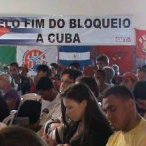
25 April 2012 | Chronicles | 5th National Seeds Festival MPA-Brazil | Food Sovereignty
Seeds in the Crosshairs
Interview with Daniela Nerling: Native seeds and their vital importance
Download: MP3 (1.3 Mb)
Agronomist Daniela Nerling explains the social tissue that the Small Farmers Movement of Brazil (MPA) has been able to build around its seed improvement plant (called UBS) in Santa Catarina state.
Seeds as a peasant heritage at the service of humanity are the focus of the MPA in the south of Brazil, which has been invaded by GM corn and soy monoculture plantations.
Nearly 55 peasant families operate as the guardians of creole seed varieties so that another thousand families multiply them through agroecological practices, Daniela told Real World Radio at the Native Seed Festival celebrated in Anchieta.
The member of the MPA said about the festival that there are more and more producers who approach the movement in search for access to creole seeds, since the market price of seeds has increased considerably.
“For some peasants, native seeds are not only about making a living, they have a deeper meaning”. This is clear when visiting some of the peasant lands close to the UBS plant. Real World Radio visited the lands as part of an international delegation. The lands produce corn and beans and the families have a clear awareness that harvesting their own seeds gives them more freedom and the possibility to resist climate change as well as persona pride”.
“The installation of the plant in the area had a significant impact. It saved us”, said one of the producers.
The fresh products produced there are commercialized in two weekly markets in the town of San Miguel del Oeste. The seeds go to UBS and for the peasant’s consumption.
“Before working at the UBS plant I used to plant soy here”, says one of the peasants. “We didn’t know what that meant, planting GMOs, now we know and we multiply native varieties”.
They are attached to their land. He showed us one of the trees planted by his father fifty years ago following a European tradition of securing wood for the house to the future generations.
The region where the UBS plant is used to be a tobacco monoculture plantation, as part of the current area close to Santa Cruz in Rio Grande do Sul, where the MPA has a training center where it promotes production, food and agro-energy diversification, thus confronting the tobacco-producer transnational corporations.
Daniela works as coordinator of UBS technical team, both in the rural area and in the plant. She said it is difficult to prevent GM contamination of native varieties that are surrounded by GM crops.
So they need constant planning to avoid the pollination periods between native and GM seeds to coincide.







